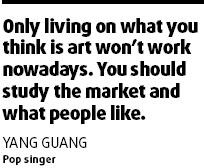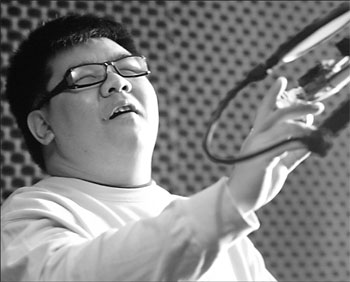Spending time in the sun
Sinking in the sofa, Yang Guang tells his manager, a slim man standing by: "Tell them, that's the price." When he hears footsteps, he rises quickly. "Hello," he offers a hand.
Dressed in a yellow Converse sweater and loose blue jeans, the plump young man looks like most 20-somethings you see on the street. But behind his black-rimmed glasses, he lives in darkness.
"Yang Guang" means "sunshine" in Chinese. This radiant name, however, did not prevent him from becoming blind when he was eight months old. As the saying goes, when one door shuts, another opens. For Yang, it was music that brightened up his life.
|
Yang Guang records at a studio. Zhang Wei |
On the eve of the Spring Festival, Yang amazed millions by imitating voices of celebrities and singing at China Central Television's gala show. Overnight fame has changed the 29-year-old's life. "The biggest difference is in one word: busy," he says.
As he sits on the sofa, answering questions, neither too fast nor slow, his manager and mother keep on interrupting the interview: "What to wear for tomorrow's show?" "Have you chosen the song for Hunan TV's evening show?" "CCTV-4 called, is Feb 24 alright?"
If not for a gift his father bought for him at 7, it is hard to imagine where he would be. On the electronic organ, the boy recited the melody of a popular TV serial's theme song. His parents, both factory workers in Harbin, Heilongjiang province of Northeast China, soon found a music coach for their son.
In 1990, Yang was picked up by a local art troupe formed by disabled people. The 11-year-old played piano. But he soon gave up.
"It is almost impossible for a blind man to be a great pianist, because I cannot recite the notes as quickly, neither can I communicate with the orchestra effectively."
In his eight years in the troupe, Yang focused on improving his singing skills. The efforts paid off. When a Beijing art troupe wanted to recruit some new staff, he was chosen.
He insisted on living in Beijing alone, telling his mother he could take care of himself. This strong will, he says, comes from his grandma, the first person who told him that he was no different from anyone else.
"My grandma was a very strong woman, she raised six children during the hard 1960s," Yang says. "She often told stories of how she survived these trials. Although I have to admit as a little boy I did not like those stories, they did have a great influence on me."
Yang was not popular in the troupe, however. He was particular about each performance and some senior staff did not like him, including an assistant assigned to look after him. But one incident would change their views.
Once, due to his assistant's oversight, Yang fell down by a mountainous road and hurt his hands and legs severely. But when they found a hospital the next morning, Yang refused to be anesthetized, saying it was unnecessary. His assistant, seeing the doctor picking out the dust and gravel from Yang's wounds, was stunned.
"I wanted to show them I was stronger than they thought. I can do everything," he says.
The troupe's leader assigned two more assistants for Yang. But the young man was leaving anyway.
"In the troupe I can survive, but cannot develop."
His definition of development is to win both bread and art.

"Do you know how many underground bands are eating pickles every day in Beijing?" he asks. "I won't lead that life. Only living on what you think is art won't work nowadays. You should study the market and what people like."
He joined in a contest held by a radio station as his first step. To borrow 5,000 yuan ($690) to record a demo, he waited outside a friend's house in rain for half an hour. Since then, Yang has forged a career as an independent singer and composer.
Unlike most dreamers, he did not stay in Beijing, but rushed all over the country for performances and selling his songs. He is proud of his flexibility, saying that he only heads toward where chance is. Xiang Yang, his old friend and a former DJ, describes Yang as a person who knows what he is good at and what he wants.
"He is open to our opinions," Xiang says. "But at the same time he has very clear ideas of what he wants, and is strong-minded."
In 2007 Yang appeared on a popular talent show called Star Boulevard (Xingguang Dadao). He won with a song named You Are My Eyes, which he sang for his mother.
In his mother's eyes, Yang is a very independent boy.
"Many people think I must have been worrying about him all the time, but he always tries to do things by himself. He is totally capable of taking care of himself," says his mother who has come to Beijing to help him manage his busy schedule.
His friend Xiang says Yang doesn't like the stereotypes associated with blind people.
"He never thinks he is a disabled man who needs help. He likes to help others. When he was competing in Star Boulevard, he helped some contestants revise their songs."
Xiang also says that Yang's friends never worry about saying words like "eyes" before him.
"Actually, Yang Guang likes to use the words 'look' and 'read'," he says. "Sometimes when he listens to comedies, he tries to imagine and imitate the comedians' facial expressions to amuse us."
Yang is now preparing for his first album, which will be released in May and a radio program about his life is also to be recorded.
(China Daily 03/04/2008 page20)















